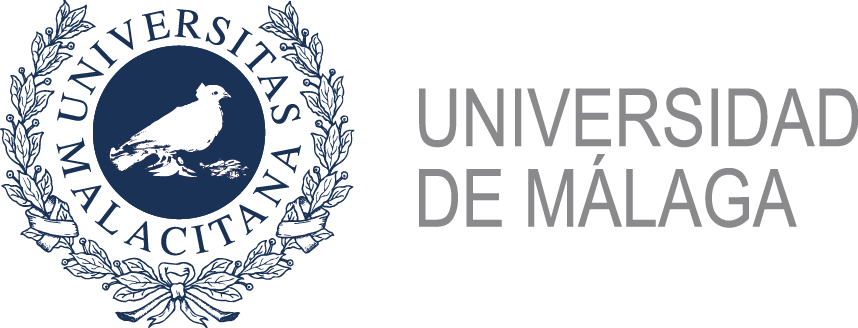Universidad de Málaga (UMA)
The University of Malaga (UMA) is one of Spain's leading institutions of higher education (world ranking: 736) [2016]. Since its founding in 1972, UMA has rapidly expanded its international presence and prestige. Currently, UMA has 2 campuses (1,797,247 m2), +35,000 students, +2,400 professors, 23 faculties and schools, 82 departments, 200 educational programs (incl. 68 undergraduate, 75 master's and 34 doctoral programs), 200 doctoral theses/year, 278 research groups, research projects (425 national / 150 EU [2007-2016]) and +1,800 business contacts. Regarding international relations, UMA maintains bilateral agreements with +550 universities worldwide (Europe, Ibero-America, North Africa, Asia, USA/Canada, Australia, New Zealand, Japan, South Korea, etc.) with +1,000/+1,000 exchange students (incoming/outgoing)/year and +100/+100 exchange researchers (incoming/outgoing)/year. UMA actively participates in various international (LLP, Erasmus Mundus, Tempus, Erasmus+, ISEP, Fulbright, AUIP, etc.), national/regional (Ministry of Education, Gov, Talentia, ICEX, etc.) and private (Santander, Unversia, Caixa, Caja Madrid, etc.) programs, all managed by the International Affairs and Cooperation Unit (UIAC). UMA is a member of more than 100 networks/associations. The UMA is a member of more than 100 networks/associations. The UMA stimulates educational innovation and research by boosting the quality of its professors and research groups through its participation in international research projects -managed by the OTRI (Oficina de Transferencia de Resultados de Investigación)- with the support and sponsorship of companies from the local TechPark (PTA). The university has a dedicated career center that fosters the employability of students and young researchers by offering a broad portfolio of services including academic/professional counseling, paid internships/scholarships, etc. UMA complies with the following quality standards: EFQM 200, EFQM 300, ISO 9001, ISO 14001, etc. In addition, the UMA is part of the campus of excellence "Andalucía Tech". The UMA staff that will participate in the project includes education experts, researchers, technical and administrative staff.
As a partner, the University of Malaga will actively participate in the realization of all intellectual outputs and will contribute to the management and implementation of the project. The University of Malaga has extensive experience in EU projects, especially with a focus on knowledge transfer and innovation in European contexts puts UMA in an ideal position to ensure that the materials and services developed in the RED project conform to the quality expectations of the ERAMUS+ program. Key people involved in this project Dr. Julio Ruiz-Palmero: PhD in Educational Technology from the University of Malaga (Extraordinary Doctorate Award), Master in New Technologies Applied to Education, University Expert in Virtual Training Environments. Evaluator of the National Agency of Evaluation and Prospective (ANEP) of the Ministry of Science and Innovation. Editor of the journal Innoeduca. International Journal of Educational Technology and Innovation. He is a member of scientific committees and is a reviewer of different scientific journals specialized in educational technology. Dr. José Sánchez-Rodríguez: Doctor in Pedagogy from the University of Málaga. Professor of the Department of Didactics and School Organization. Member of the association EDUTEC (Association for the development of Educational Technology and New Technologies applied to education). Dr. Enrique Sánchez-Rivas: Doctor in Pedagogy from the University of Malaga. He has extensive experience in public teaching, where he has held various positions. He is currently a professor in the Department of Theory and History of Education at the University of Malaga. His work in the classroom has been recognized with the prestigious Santillana Award for educational experiences. Dr. Ernesto Colomo-Magaña PhD in Educational Sciences from the University of Malaga. He has experience in public and private university teaching. He is currently a professor in the Department of Theory and History of Education at the University of Malaga and his research focuses on educommunication, teacher training, analysis of teacher identity and axiology.







